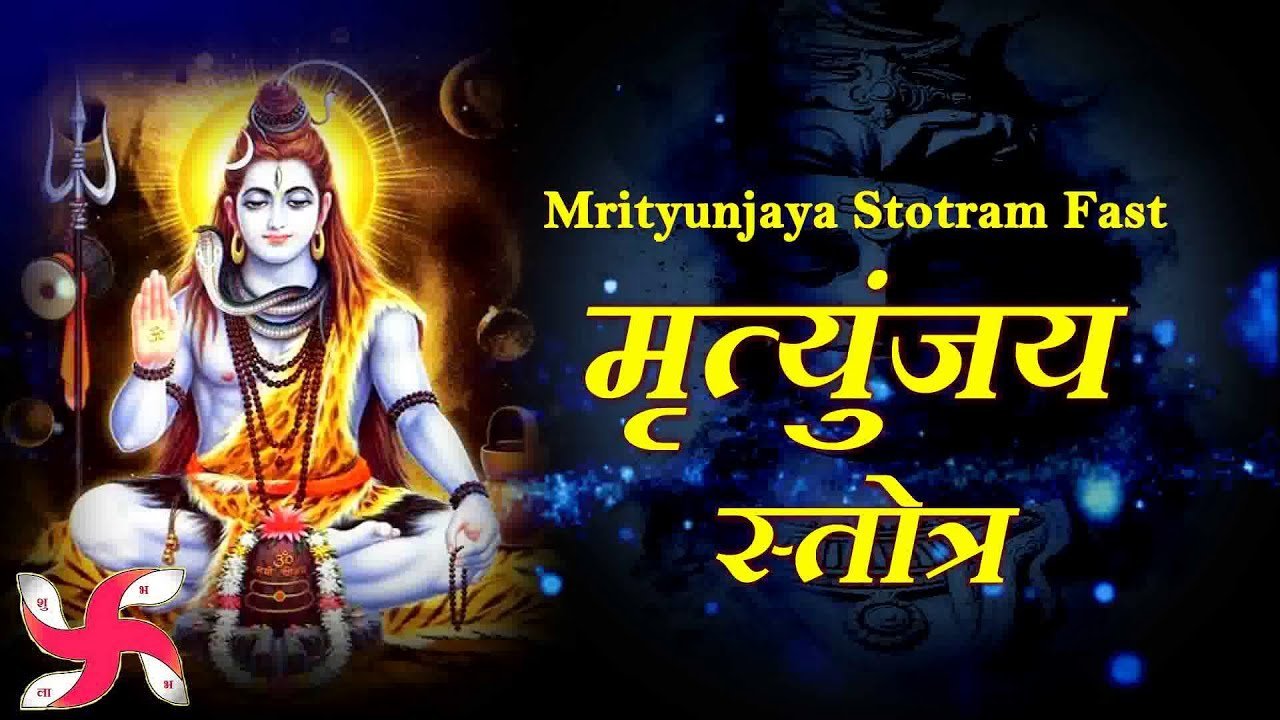मृत्युञ्जय स्तोत्र एक अत्यंत प्रसिद्ध और प्रभावशाली वैदिक स्तोत्र है, जिसे भगवान शिव की आराधना में गाया जाता है। इसका मुख्य उद्देश्य मृत्यु के भय से मुक्ति पाना, जीवन में सुरक्षा और आरोग्य प्राप्त करना है। इस स्तोत्र का पाठ विशेष रूप से दीर्घायु और मानसिक शांति के लिए किया जाता है। आइए इस स्तोत्र के विभिन्न पहलुओं पर विस्तार से चर्चा करें:
मृत्युञ्जय स्तोत्र
मार्कण्डेयप्रोक्तं नरसिंहपुराणे ॥
मार्कण्डेय उवाच
नारायणं सहस्राक्षं पद्मनाभं पुरातनम् ।
प्रणतोऽस्मि हृषीकेशं किं मे मृत्युः करिष्यति ॥६३॥
गोविन्दं पुण्डरीकाक्षमनन्तमजमव्ययम् ।
केशवं च प्रपन्नोऽस्मि किं मे मृत्युः करिष्यति ॥६४॥
वासुदेवं जगद्योनिं भानुवर्णमतीन्द्रियम् ।
दामोदरं प्रपन्नोऽस्मि किं मे मृत्युः करिष्यति ॥६५॥
शङ्खचक्रधरं देवं छन्नरूपिणमव्ययम् ।
अधोक्षजं प्रपन्नोऽस्मि किं मे मृत्युः करिष्यति ॥६६॥
वाराहं वामनं विष्णुं नरसिंहं जनार्दनम् ।
माधवं च प्रपन्नोऽस्मि किं मे मृत्युः करिष्यति ॥६७॥
पुरुषं पुष्करं पुण्यं क्षेमबीजं जगत्पतिम् ।
लोकनाथं प्रपन्नोऽस्मि किं मे मृत्युः करिष्यति ॥६८॥
भूतात्मानं महात्मानं जगद्योनिमयोनिजम् ।
विश्वरूपं प्रपन्नोऽस्मि किं मे मृत्युः करिष्यति ॥६९॥
सहस्रशिरसं देवं व्यक्ताव्यक्तं सनातनम् ।
महायोगं प्रपन्नोऽस्मि किं मे मृत्युः करिष्यति ॥७०॥
इत्युदीरितमाकर्ण्य स्तोत्रं तस्य महात्मनः ।
अपयातस्ततो मृत्युर्विष्णुदूतैश्च पीडितः ॥७१॥
इति तेन जितो मृत्युर्मार्कण्डेयेन धीमता ।
प्रसन्ने पुण्डरीकाक्षे नृसिंहे नास्ति दुर्लभम् ॥७२॥
मृत्युञ्जयमिदं पुण्यं मृत्युप्रशमनं शुभम् ।
मार्कण्डेयहितार्थाय स्वयं विष्णुरुवाच ह ॥७३॥
य इदं पठते भक्त्या त्रिकालं नियतः शुचिः ।
नाकाले तस्य मृत्युः स्यान्नरस्याच्युतचेतसः ॥७४॥
हृत्पद्ममध्ये पुरुषं पुराणं नारायणं शाश्वतमादिदेवम् ।
सञ्चिन्त्य सूर्यादपि राजमानं मृत्युं स योगी जितवांस्तदैव ॥७५॥
इति ।
नरसिम्हपुराण अध्याय ७ श्लोकसंख्या ७५
श्रीनरसिंहपुराणे मार्कण्डेयमृत्युञ्जयो नाम सप्तमोऽध्यायः ॥७॥
मृत्युञ्जय का अर्थ:
“मृत्यु” का अर्थ होता है मृत्यु और “जयं” का अर्थ होता है जीत। इस प्रकार, “मृत्युञ्जय” का अर्थ है “मृत्यु पर विजय पाने वाला।” भगवान शिव को मृत्युञ्जय कहा जाता है, क्योंकि वे मृत्यु के अधिपति माने जाते हैं और उन्हें प्रसन्न कर मृत्यु को पराजित किया जा सकता है।
मूल स्तोत्र:
मृत्युञ्जय स्तोत्र में सबसे प्रमुख मंत्र है महामृत्युञ्जय मंत्र, जो ऋग्वेद से लिया गया है:
“ॐ त्र्यम्बकं यजामहे सुगन्धिं पुष्टिवर्धनम्। उर्वारुकमिव बन्धनान् मृत्योर्मुक्षीय मामृतात्॥”
इसका अर्थ है: “हम तीन नेत्रों वाले भगवान शिव की आराधना करते हैं, जो हमें जीवन की सुगंध देते हैं, हमारी समृद्धि और स्वास्थ्य को बढ़ाते हैं। जिस प्रकार खीरा पकने पर बेल से मुक्त हो जाती है, उसी प्रकार हमें मृत्यु के बंधनों से मुक्त कर अमरत्व प्रदान करें।”
मृत्युञ्जय स्तोत्र की उत्पत्ति:
पुराणों के अनुसार, यह माना जाता है कि इस स्तोत्र की उत्पत्ति स्वयं भगवान शिव ने की थी। इसे महर्षि वशिष्ठ और महर्षि मार्कंडेय द्वारा प्रकट किया गया था। एक कथा के अनुसार, ऋषि मार्कंडेय के जीवन को बचाने के लिए यह मंत्र भगवान शिव ने दिया था। इस मंत्र के प्रभाव से ही यमराज पर विजय प्राप्त की जा सकती है।
लाभ और महत्व:
मृत्युञ्जय स्तोत्र के नियमित पाठ से अनेक लाभ मिलते हैं:
- आरोग्य: इस स्तोत्र के पाठ से व्यक्ति को शारीरिक और मानसिक स्वास्थ्य में सुधार मिलता है। यह रोगों से मुक्ति दिलाने में सहायक होता है।
- मृत्यु का भय: जो लोग असमय मृत्यु या दुर्घटनाओं का भय महसूस करते हैं, उनके लिए यह स्तोत्र विशेष रूप से प्रभावी माना जाता है।
- आध्यात्मिक उन्नति: भगवान शिव की कृपा से यह स्तोत्र व्यक्ति को आध्यात्मिक शांति और ज्ञान प्राप्ति में मदद करता है।
- दीर्घायु: इस स्तोत्र के पाठ से दीर्घायु की प्राप्ति होती है। इसे करने से जीवन के नकारात्मक प्रभाव कम होते हैं।
पाठ की विधि:
- मृत्युञ्जय स्तोत्र का पाठ ब्रह्म मुहूर्त में करना सबसे शुभ माना जाता है। सुबह के समय या सूर्यास्त के समय भी इसका पाठ किया जा सकता है।
- इसे शुद्ध मन और शांत वातावरण में किया जाना चाहिए।
- पाठ करने से पहले भगवान शिव की मूर्ति या चित्र के समक्ष दीपक जलाकर, फूल अर्पित करके पूजा करनी चाहिए।
- यह स्तोत्र कम से कम 108 बार जाप करने से विशेष फलदायी होता है। इसके लिए रुद्राक्ष की माला का प्रयोग किया जाता है।
धार्मिक और ऐतिहासिक संदर्भ:
- मृत्युञ्जय स्तोत्र का वर्णन शिव पुराण, ऋग्वेद, और अन्य वैदिक ग्रंथों में मिलता है। इसे शिव जी की आराधना का एक महत्वपूर्ण अंग माना गया है।
- भारतीय संस्कृति में महामृत्युञ्जय मंत्र का विशेष महत्व है। इसे जीवन में आने वाले संकटों को दूर करने के लिए किया जाता है। यह मंत्र विशेष रूप से रोगों, असमय मृत्यु, और कष्टों से मुक्ति दिलाने में सहायक है।
धार्मिक दृष्टि से देखा जाए तो यह स्तोत्र भगवान शिव को समर्पित है और इसे साधना के रूप में किया जाता है। वहीं, वैज्ञानिक दृष्टिकोण से भी इस मंत्र का जप करने से मानसिक शांति प्राप्त होती है, जिससे तनाव कम होता है और व्यक्ति की जीवन ऊर्जा बढ़ती है।





